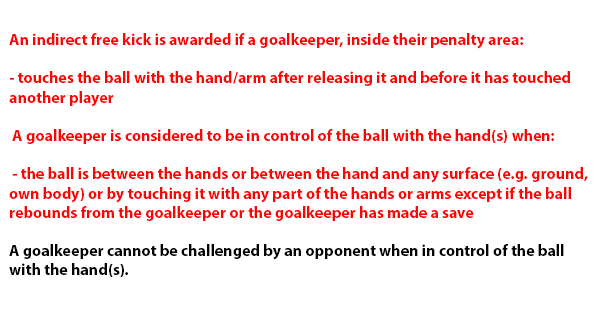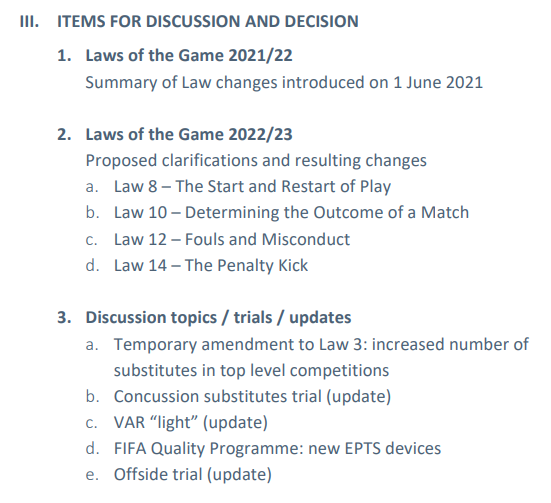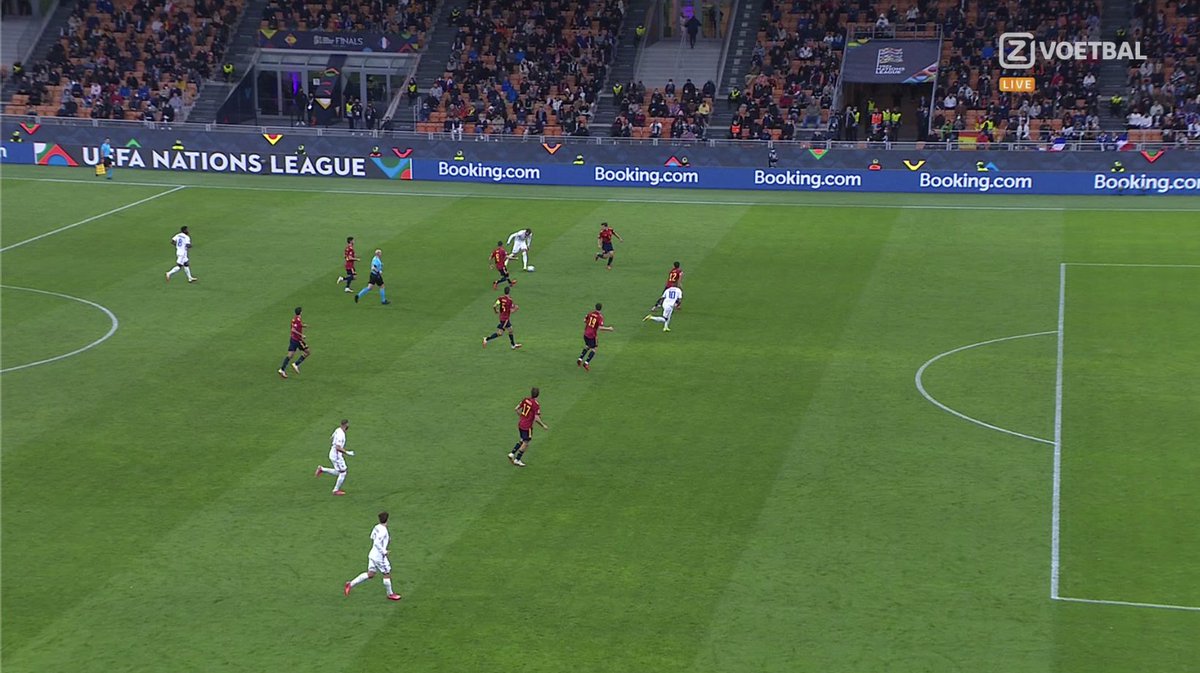
Decided to get the Monday VAR thread out early this week, to fully explain Aston Villa's disallowed goal:
- No option but to disallow the goal
- What the wording of Law 12 means
- Why the "save" element has confused people
- Why the Newcastle goal is different
- Other incidents
- No option but to disallow the goal
- What the wording of Law 12 means
- Why the "save" element has confused people
- Why the Newcastle goal is different
- Other incidents
Here's the video of what happened. I'd advise waiting for all tweets on this before asking questions - everything will be covered.
There is a misconception that a goalkeeper must have two hands on the ball to be in control.

There is a misconception that a goalkeeper must have two hands on the ball to be in control.

Here are the relevant sections of Law 12 relating to a goalkeeper being in possession. I'll use this a few times and highlight certain clauses to explain what it means.
Let's start with the section that means the goal cannot possibly be allowed to stand.
Let's start with the section that means the goal cannot possibly be allowed to stand.

So, as of this point, it is against the Laws of the Game for Kasper Schmeichel to "be challenged by an opponent" because having one hand on the ball, which is on the ground, is deemed being in control of the ball.
Jacob Ramsey has to be penalised with a direct free-kick.
Jacob Ramsey has to be penalised with a direct free-kick.

Some said it's "not a clear and obvious error," but it absolutely is.
Michael Oliver gave the goal because he thought Ramsey got to the ball before Schmeichel. But it was the other way around, and therefore a goal simply cannot be allowed to stand.
It is 100% a VAR overturn.
Michael Oliver gave the goal because he thought Ramsey got to the ball before Schmeichel. But it was the other way around, and therefore a goal simply cannot be allowed to stand.
It is 100% a VAR overturn.
Here is a section of referee guidance which explains that if any part of the hand or arm, even just the fingertips, is in contact with the ball on the ground, the goalkeeper is in possession.
And therefore he cannot be challenged for the ball.
NB: No mention of a save.
And therefore he cannot be challenged for the ball.
NB: No mention of a save.

But this guidance is not new. The section I posted in the previous tweet is from guidelines issued in April 2010, but it predates.
Keeper possession was rewritten because of several incidents in the 1990s, including this infamous Gary Crosby goal.
Keeper possession was rewritten because of several incidents in the 1990s, including this infamous Gary Crosby goal.
Now to explain the section of the Law which has been totally misunderstood - the rebound/save element.
And with good reason. Many of the Laws are not written clearly, and as I often say you cannot correctly referee a football match just from reading the Laws of the game.
And with good reason. Many of the Laws are not written clearly, and as I often say you cannot correctly referee a football match just from reading the Laws of the game.

Everyone has applied this clause to try and fit the Schmeichel incident. You can't. You must consider the whole clause.
If you say Schmeichel doesn't have control with one hand after a save, you are also saying a keeper doesn't have control after a save if holding with BOTH.
If you say Schmeichel doesn't have control with one hand after a save, you are also saying a keeper doesn't have control after a save if holding with BOTH.

So the attempted interpretation to allow Ramsey's goal would mean goalkeeper could be challenged at any point after they have made a save.
Schmeichel could have the ball in two hands and Ramsey could still kick it.
So what does it actually mean?
Schmeichel could have the ball in two hands and Ramsey could still kick it.
So what does it actually mean?
The clause actually sets out when a goalkeeper is in control of the ball, and when they aren't, for the purposes of touching the ball a second time.
It is defining when a goalkeeper can touch the ball again after releasing it.
It is defining when a goalkeeper can touch the ball again after releasing it.
The Law says that a keeper is in control "by touching it with any part of the hands or arms".
When making a save, a keeper usually touches it "with any part of the hands or arms".
Without the clause, a keeper couldn't touch the ball again after a save before another player has.
When making a save, a keeper usually touches it "with any part of the hands or arms".
Without the clause, a keeper couldn't touch the ball again after a save before another player has.

So, without the clause "if the ball rebounds from the goalkeeper or the goalkeeper has made a save" he would not be able to touch the ball again before another player.
The clause literally allows Schmeichel to touch the ball again, it doesn't say he can't be in control.
The clause literally allows Schmeichel to touch the ball again, it doesn't say he can't be in control.

Here is another section from the referee guidelines.
It specifically describes how the clause on the rebound/save is about a goalkeeper being able to handle the ball again before its touched by another player.
It is NOT to prevent him from having control of the ball.
It specifically describes how the clause on the rebound/save is about a goalkeeper being able to handle the ball again before its touched by another player.
It is NOT to prevent him from having control of the ball.

So:
- The save clause allows Schmeichel to touch the ball a second time
- Control is established as soon as the hand is on top of the ball, even for half a second
- The save and control of the ball aren't related to create an exemption for Ramsey to kick the ball

- The save clause allows Schmeichel to touch the ball a second time
- Control is established as soon as the hand is on top of the ball, even for half a second
- The save and control of the ball aren't related to create an exemption for Ramsey to kick the ball


Here's a similar example from MLS.
New York Red Bulls vs. New York City FC.
- The keeper makes a hash of a save.
- Stops it on the line
- Striker kicks it in from under his hand
- Goal is disallowed by the referee
New York Red Bulls vs. New York City FC.
- The keeper makes a hash of a save.
- Stops it on the line
- Striker kicks it in from under his hand
- Goal is disallowed by the referee
Though there is a little quirk to this story, as the goal was eventually allowed for the goal being the ball just over the line when the keeper stopped it.
But it was disallowed initially for the act of the striker.
MLS doesn't have goal-line tech.
But it was disallowed initially for the act of the striker.
MLS doesn't have goal-line tech.
The difference between Schmeichel and Nick Pope is quite obvious.
The Law states that "a goalkeeper cannot be challenged by an opponent when in control of the ball".
But Pope isn't challenged by the player he collides with.
The Law states that "a goalkeeper cannot be challenged by an opponent when in control of the ball".
But Pope isn't challenged by the player he collides with.
At no point is Fabian Schar challenging the goalkeeper. Pope runs into him, loses control of the ball, and it falls to Callum Wilson to score.
There is no foul here, as we have seen with several other similar incidents this season (Sanchez, Pickford).


There is no foul here, as we have seen with several other similar incidents this season (Sanchez, Pickford).



Kiernan Dewsbury-Hall wanted a penalty after this challenge by Douglas Luiz.
The Premier League set out that this kind of minimal contact on the top of the foot should not be given as a penalty this season, so there was no chance of a VAR review.
The Premier League set out that this kind of minimal contact on the top of the foot should not be given as a penalty this season, so there was no chance of a VAR review.

Emmanuel Dennis went down in the area under this contact from Rodri, but again the guidance is that contact and an attacker's motives are key.
Delayed fall + contact didn't cause the player to go down.
Last season this may well have been a penalty, certainly not this season.



Delayed fall + contact didn't cause the player to go down.
Last season this may well have been a penalty, certainly not this season.




• • •
Missing some Tweet in this thread? You can try to
force a refresh











